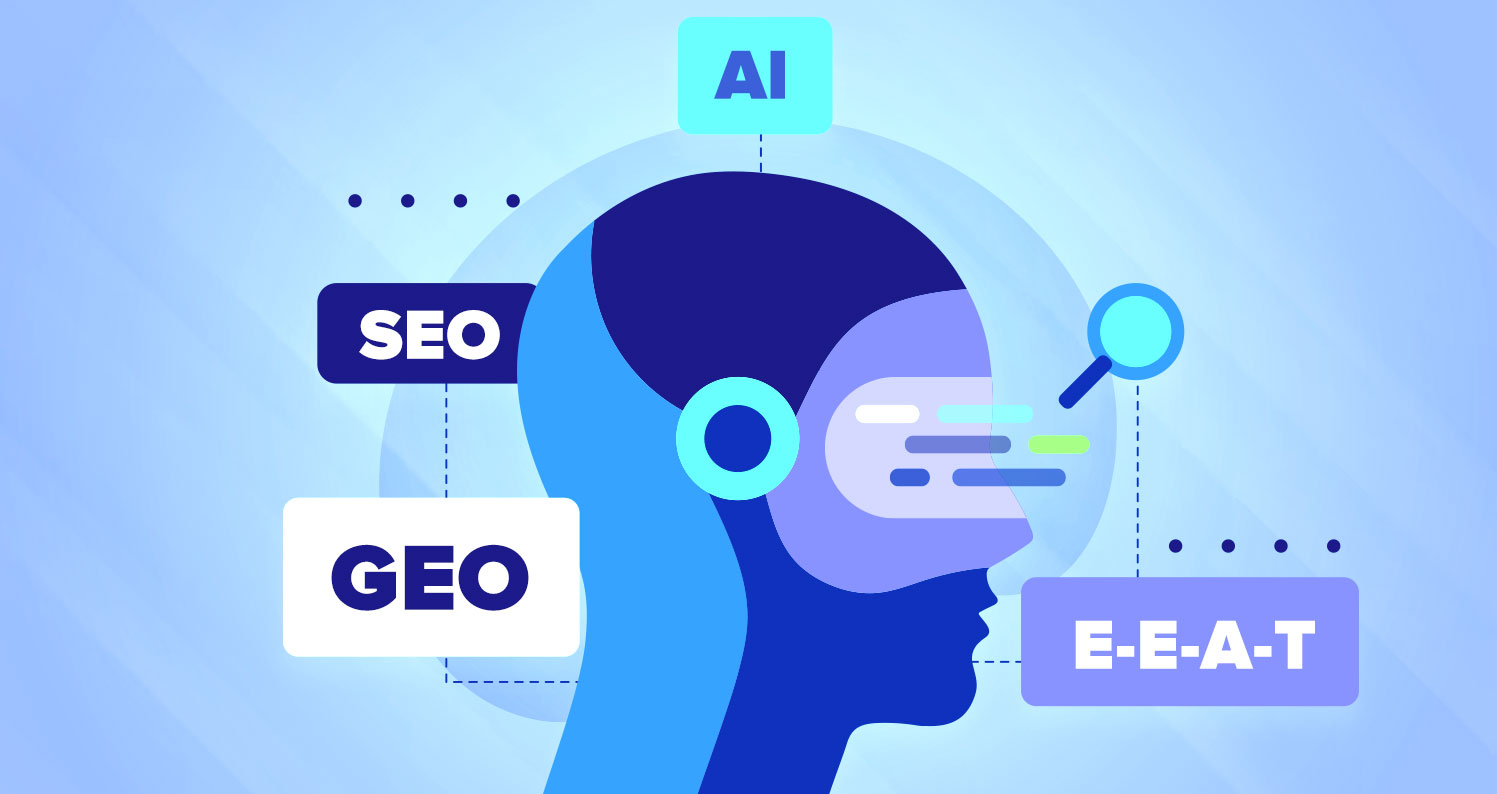SEO Trends (2025): Advance Your Organic Search Strategy
Shifts in user search behavior and advancements in AI tech are at the epicenter of recent organic search shakeups. Here are the latest SEO trends for 2025.

The organic search landscape is changing rapidly, driven by advancements in AI technology, shifts in user behavior, and core updates to Google algorithms.
When traditional SEO tactics seem less effective, adapting your strategy to account for these advanced trends could make for a more successful outcome.
Shifts in user search behavior.
Through engagement data and predictive technology, search engines have improved their understanding of the context and purpose behind user queries. This led to vast changes in the layout of search engine results pages (SERPs).
At the same time, users adapted to the new nature of search, which is now more results driven. In turn, consumers are more reliant on fast, credible answers and built-in SERP features.
This has led to shorter engagement rates, fewer clicks, and higher expectations around quality in search results.
Modern SEO strategies must account for these shifts in user behavior:
- Users don’t want more clicks. They want answers.
- Consumers want to quickly find the best products at the best prices from reputable, trustworthy sellers.
- Buyers want to see options and endorsements when searching (e.g., side-by-side comparisons, trusted review sites) without clicking through seemingly endless results.
- People incorporate brand trust into their decision making now more than ever. However, one shouldn’t mistake brand trust for brand loyalty.
The best SEO strategies account for these trends and anticipate user needs. It’s essential that brands address these shifts in user behavior through web content, web design, and brand development efforts.
As usual, this is easier said than done, but it serves as a launching point for a modern SEO campaign that can yield lasting results.

SERP features like AI overviews are reshaping the way users find information.
Advancements in AI search technology.
For years, Google has been using AI in their search algorithms to better understand user intent and provide better, more relevant results.
In earlier days, search engines may not have been able to understand common patterns, like misspellings and typos. They might even have had trouble connecting the dots between different approaches that people use when searching for the same things with the same intent.
Today, Google goes beyond words, using AI technology to present the best results possible. This is accomplished through a better understanding of concepts, context, and intent for each query.
With generative AI shaping search results, it is important to see the full picture. You must consider how it affects rankings and your SEO efforts.
As of this writing, these are the AI systems used to generate Google Search results.
RankBrain: Smart Ranking Beyond Keywords
Machine learning and AI improvements to search algorithms mean that Google is getting better at understanding what users are seeking.
Users are also searching in unique ways. In fact, 15% of daily searches are completely new.
The biggest development in this area started with the deployment of RankBrain, the very first deep-learning AI system.
Still at the core of Google Search, RankBrain allows Google to relate words in search queries to real-world concepts. It then adapts rankings in SERPs to better relate to these concepts. In short, it’s no longer relying on keywords alone.
Neural Matching: Personalized Search Results
Neural networks are an advanced machine-learning technique, where AI is learning similarly to human brain patterns by routinely receiving feedback and adjusting parameters.
In 2018, Google implemented neural matching that allowed AI systems to become better at understanding the content and concepts presented on websites, as well as connecting them to the users’ search queries.
As a result, Google now provides personalization and can try to guess the right category to present in the SERP, even if certain keywords are missing from the query.

Voice search and AI are redefining how users interact with search engines—faster, smarter, and more intuitive than ever.
BERT: Understanding Meaning & Intent
Often, users form queries without all the necessary words, following natural language, where another person would understand the meaning behind the question. However, it could be much more complex for a machine to make that connection.
If you type in the search “my IP address,” people would understand you want info on “your individual” IP address—not just common knowledge about IP addresses. Prior to BERT, AI systems may have overlooked the importance of the word “my” in the query and focused on the results about the common knowledge about IP addresses.
Since introducing BERT in 2018, Google has been able to make that distinction and can understand the intent based on the combination of words together.
Today, BERT plays a crucial role in ranking and retrieving Google search results based on relevance.
MUM: Specialized Application
In May 2021, Google introduced the latest in AI technology—the Multitask Unified Model—or “MUM.” A thousand times more powerful than BERT, MUM can understand and generate language.
Unlike any other previous AI system, MUM’s understanding of information spans across multiple formats (i.e., multiple modals), which include text and images. It can also include more modalities, like video and audio, in the future.
While MUM is not used to help rank the search results, it is being used to power specific applications, such as when it was used to improve searches for COVID-19 vaccine information.
With the current focus on Generative AI, you can see the importance and relevance of the MUM in 2025.
AI Overviews: A Prominent SERP Feature
While not technically an AI system, AI overviews use generative AI to produce summaries of information from multiple web sources for a variety of common queries. This allows users to quickly research a topic without having to click on multiple websites.
This technology is rapidly improving. However, it may still provide inaccurate information.
Since AI overviews rely on patterns and structured data, it is becoming essential for SEOs to focus on providing accurate content on the sites they manage.
Beyond AI overviews, Google also relies on interactions like what people search for and what feedback they provide. It tracks the engagement and whether users are satisfied with the results.

Optimizing for organic search results isn’t just about keywords. There’s so much more to consider.
What are some critical organic search priorities for 2025?
Based on the changes in search results and the online landscape, here are the opportunities we tend to prioritize.
Structured Data & Enhanced Features
Research tells us Google will continue providing even more personalized results in 2025.
We can expect to see more AI overviews, featured snippets, knowledge panels, popular products, and other enhanced features. All these rich results will continue to rely heavily on websites to provide consistent and accurate structured data.
This markup helps Google understand brands, products, offerings, and services completely and correctly.
Structured data will not remain static. Based on schema.org vocabulary, Google Search structured data constantly evolves. Google is routinely expanding available properties as it develops and enhances SERPs and displayed features.
Due to Google’s expanding approach to this markup, it’s important for brands to perform routine audits. This means ensuring their markup is comprehensive and accurate. Doing anything less could lead to missed opportunities being captured by competitors.
Generative Engine Optimization
AI-generated summaries, the same AI overviews covered in the last section, were introduced in early 2024. These results quickly monopolized high-value, above-the-fold real estate in SERPs.
AI overviews provide quick answers to the search questions users ask directly below the query. This results in a reduction in clicks, as users are now getting these answers directly on the SERP.
The silver lining for websites is that this also provides more visibility for the sites linked in the AI-generated results. But how do you gain visibility in AI overviews?
Generative Engine Optimization (GEO) focuses on optimizing your site content to be more likely to be cited within AI-generated summaries.
Why should GEO be considered as part of your SEO strategy?
- Increased reach, as AI-powered results have strong visibility.
- Opportunity for higher click-through rates as users see your link directly in the answer.
- Strengthened brand positioning by being recognized by AI as a trusted source.
We’ve found gaining presence in GEO search results aligns closely with many long-standing best practices for content. This includes close adherence to Google’s own framework for how it rates content quality: E-E-A-T.

Accounting for E-E-A-T can help content rank higher. Experience, expertise, trust, and authority all contribute to SEO success.
E-E-A-T Content Framework
Google has continuously improved the framework it uses to evaluate web content quality and credibility. This framework is known as “E-E-A-T.”
What is E-E-A-T?
E-E-A-T stands for “Experience, Expertise, Authoritativeness, and Trustworthiness.” In particular, it considers these facets as they pertain to the author’s relation to the topic.
- Experience: First-hand knowledge of the topic.
- Expertise: Knowledge and expertise in the topic.
- Authoritativeness: The author’s status as an expert in the field
- Trustworthiness: The author’s credibility and reliability
Demonstrating the E-E-A-T in 2025 will continue to be the cornerstone of high-quality content favored by Google.
While all sites should adhere to publishing content that meets E-E-A-T criteria, YMYL (Your Money or Your Life) organizations have the highest responsibility in doing so.
While E-E-A-T is not a direct ranking factor, it can signal to Google that your site and content are valuable and reliable. This can boost your SEO.
We’ve had great success with E-E-A-T content strategies in the past, so it’s easy to recommend as a focus.
How can you demonstrate E-E-A-T in 2025?
If you want to incorporate E-E-A-T in your 2025 content strategy, remember these key points.
- High-quality content continues to be the foundation of success.
- Focus on your users and what they find helpful or informative.
- Offer multiple perspectives on a topic for a balanced view.
- Provide transparency and accuracy in your content.
- Link to vetted sources to show your trustworthiness.
- Build a strong portfolio of reputable backlinks, third-party site acknowledgments, and a variety of brand entities.
As trends change, so should your SEO strategy.
The SEO landscape is changing, and your strategy should change with it. Quality and trust are more critical than ever when it comes to gaining and retaining search visibility. More importantly, these qualities are key to drawing new customers while keeping those you have already.
Without proper help, it can feel impossible to keep up with. That’s why many brands choose to partner with an SEO agency who will keep them ahead of these developments.
Our team keeps current with the latest industry trends. We’re well-versed in structured data, content development, and the latest AI search enhancements, so you can be, too.
The new state of search demands an advanced SEO strategy. Contact us today to learn how we can help grow your brand through SEO and digital marketing.
More Blogs
B2B Affiliate Insights & Strategies for 2026
We review what still works for B2B brands along with ways to optimize the customer journey from an affiliate marketing perspective.B2B affiliate programs are changing fast. What used to be a simple traffic-to-lead model no longer reflects how B2B buyers actually...
AI Affiliate Marketing Strategies: Winning In The AI Era
The debate continues: Is AI a blessing or a threat to the affiliate world?On one hand, AI is making shopping faster, search results smarter, and product research more personalized. On the other hand, AI is changing how users discover content and, in some cases,...
Ecommerce Search Optimization Checklist
Get your online store SEO, GEO, and AEO ready with this helpful checklist from a digital search expert.The ecommerce landscape is changing fast. Search engines now blend traditional ranking signals with AI-generated answers, localized results, and real-time product...

 By
By 

